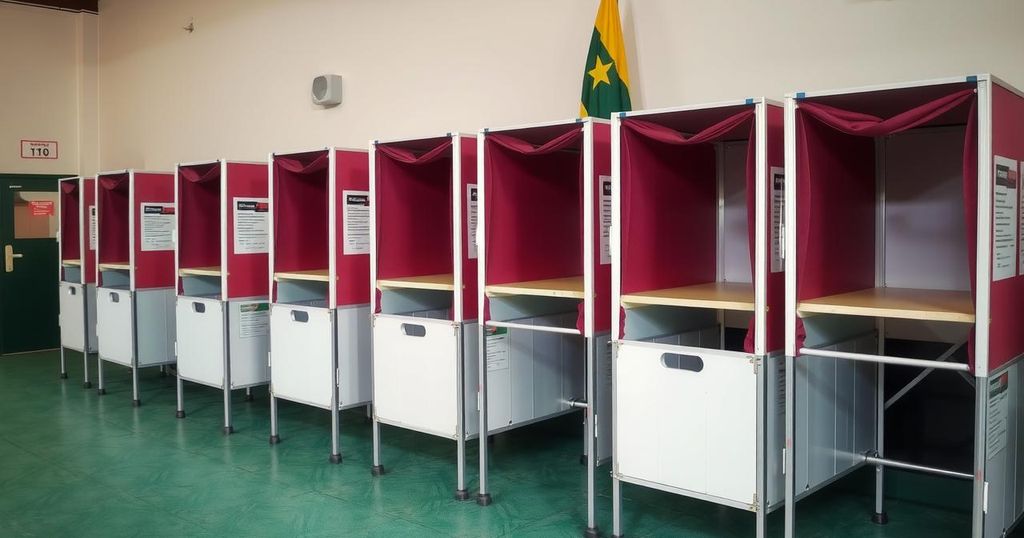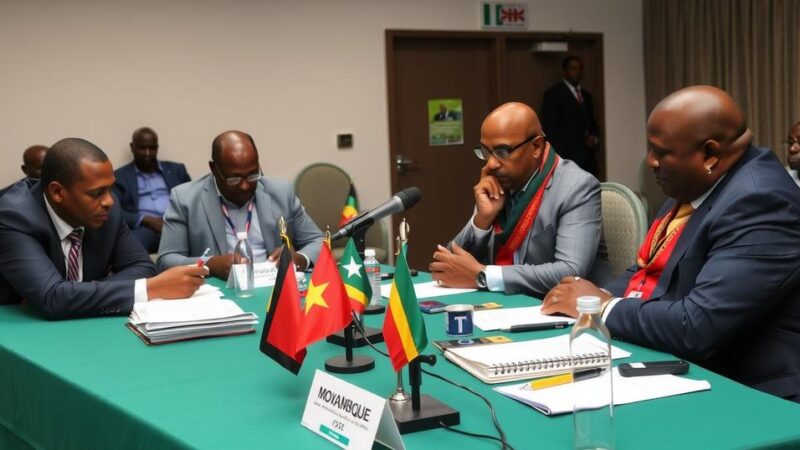Ghana is conducting general elections viewed as a crucial test of its democratic stability amid economic turmoil. Polls opened on Saturday for both presidential and parliamentary elections, featuring a competitive race between current Vice President Mahamudu Bawumia and former President John Mahama. The elections are occurring against the backdrop of a challenging economic landscape and regional instability, with initial results expected shortly after voting concludes.
Polls have commenced in Ghana’s general election, marking a significant test for the nation’s democratic integrity amidst troubling economic challenges. Voting began at 7 a.m. GMT and will conclude at 5 p.m., with preliminary results anticipated on Sunday and comprehensive presidential election results expected by Tuesday. The contest pits current Vice President Mahamudu Bawumia against former President John Mahama, both hailing from the historically underrepresented northern region, which is likely to play a pivotal role in determining the election’s outcome.
As President Nana Akufo-Addo concludes his two-term tenure, approximately 18.8 million registered voters will also elect a new parliament in this election. Historically, Ghana’s voter turnout has hovered around 70 percent. In an effort to maintain electoral integrity, the government has temporarily closed all land borders from Friday night through Sunday.
Since 1992, Ghana’s political landscape has featured a back-and-forth between the New Patriotic Party (NPP) and the National Democratic Congress (NDC), both of which have consistently alternated power. However, the NPP aims to secure an unprecedented third consecutive term through Bawumia, despite facing criticism regarding the current administration’s economic performance following a recent debt default and high inflation rates.
Bawumia, an economist educated in the United Kingdom, has committed to advancing government initiatives on digitalization and expanding educational and healthcare services. “I know what I want to do from day one in the presidency. Give me the chance to transform this nation,” he stated at a closing rally in Accra.
In contrast, Mahama has vowed to ‘reset’ Ghana’s economy and is advocating for a more robust, 24-hour economy while urging a re-examination of the country’s IMF lending program. Another key issue has arisen surrounding the impact of illegal gold mining, which continues to expand despite previous government promises to curb it, thus threatening both environmental sustainability and agricultural sectors.
Furthermore, Ghana faces potential destabilizing influences from neighboring countries plagued by political turmoil, specifically Niger and Burkina Faso. While traditionally recognized as a model of stability in a tumultuous region, Ghana’s political arena has recently depicted instances of discord, such as the brawl witnessed during the parliament’s inauguration in 2021, which required military intervention to restore order.
Ghana has long been seen as a leading example of democratic governance in West Africa, having established a track record of peaceful transitions of power since the early 1990s. The country is undergoing significant political events with its ongoing presidential and parliamentary elections, which occur against the backdrop of economic adversity. The current economic climate is characterized by inflation, a debt crisis, and a need for financial assistance from international bodies such as the International Monetary Fund (IMF). The results of these elections could significantly influence not only Ghana’s political stability but also its economic recovery and future governance.
The general election in Ghana represents a critical juncture for the nation as it seeks to balance democratic integrity with pressing economic challenges. The contest between Bawumia and Mahama highlights the internal dynamics of Ghanaian politics, particularly the rising influence of the northern regions in determining electoral outcomes. As the results unfold, the implications for governance, economic policy, and regional stability will be closely scrutinized, particularly given the backdrop of political unrest in the region.
Original Source: www.aljazeera.com







